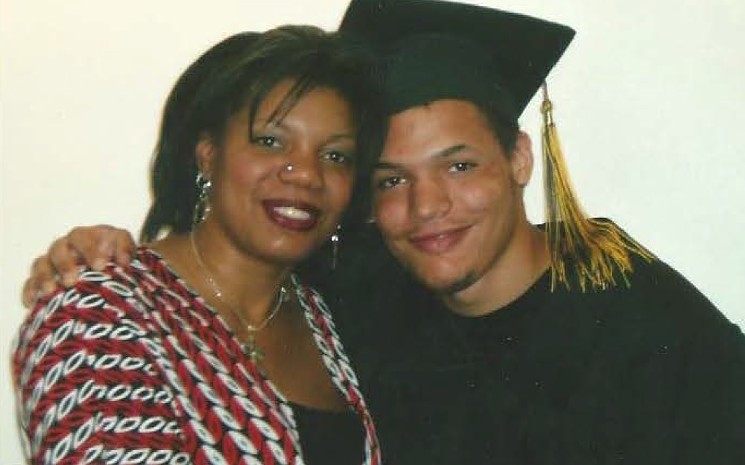In our recent report about an Arapahoe County Sheriff's Office program that allows opioid users undergoing treatment to continue taking their medication while in custody, we noted an ongoing lawsuit involving Jeffrey Scott Lillis, a former heroin addict who died of pneumonia in the county's jail. The case is one of three current complaints against Colorado counties in relation to inmate deaths at facilities that contract health-care services to private corporations attorney David Lane accuses of putting profits ahead of proper care.
"That's the common thread with all these deaths," Lane says about suits filed by the estates of Lillis, Tomas Beauford and Marciano Briones. "These companies were providing so-called medical services that should have saved all of their lives. But instead, because they did absolutely nothing, three people are dead in Colorado that we know of. And those are just the cases in my office."
The firm accused of failing Lillis and Beauford is Correct Care Solutions (CCS), one of the defendants in a lawsuit over the jail death of Jennifer Lobato, which was settled in 2016 by Jefferson County to the tune of $2.5 million. As for the Briones matter, its defendants include Corizon Health, named in a complaint over the May 2015 heroin-withdrawal death of Tyler Tabor in Adams County jail.
Lillis was 37 when he died on December 14, 2014, of sepsis and bacterial pneumonia that didn't exactly sneak up on him, Lane contends. "He was slowly getting sicker and sicker, and they did nothing for him. He was coughing up blood and they still did nothing for him. He died of the infection — and for a young man like him to die of pneumonia while in custody is really inexcusable."
He emphasizes that "this was a long, slow slide to the grave, and they never intervened, never took him to the hospital, never did anything to help him. And finally, he died."
In regard to Beauford, Lane reveals that a few days prior to his April 16, 2014, death in Mesa County jail, he "was in a group home for severely developmentally disabled people in Grand Junction. But the problem is, he was a child in the body of an adult, and when he'd get upset and have a tantrum, he wasn't a four-year-old doing it; he was a large man. So police would get called out from time to time — and because our wonderful criminal-justice system is one size fits all, he'd be taken to jail and be treated like any other inmate."
His incarceration on April 14 of that year immediately put him in danger. Beauford had been prescribed a slew of medications for seizures and other conditions related to his disability: lithium carbonate, Olanzapine, Oxcarbazepine, potassium chloride, Propranolol, Benztropine, clonazepam and Divalproex. But "like a kid, he didn't always want to take his meds — and because the jail is filled up with untrained people, they let him make his own choices about whether to take them or not, even though they knew he was developmentally disabled," Lane allows.
Without the medication, Beauford began to have seizures. To address them, he had been taught how to boost an implanted Vagus Nerve Stimulator, known in the medical field as a VNS. As described in the complaint, the VNS is "programmed to cycle on and off, giving stimulation at regular intervals during the day to the Vagus nerve," a part of the automatic nervous system that controls involuntary bodily functions such as the heart rate. At times when a seizure is about to take place, individuals receive a warning called an aura — and when that happens, they know to hold the bracelet to their chest. By doing so, a special magnet in the bracelet delivers a de facto shock that typically prevents the seizure from taking place or dramatically reduces its intensity or duration.
Without the bracelet, Beauford had "several seizures," Lane notes. "He'd have them and then he'd come out of them — and the personnel at the jail didn't do anything about them. They never took him to medical. Then, finally, he had a grand mal seizure, and it killed him."
During an interview for the lawsuit that followed, Lane maintains, "the doctor said some of the most ludicrous, ridiculous things imaginable. I told him, 'In your own file, it said Beauford couldn't make a medical decision. Isn't refusing critical, life-saving medications a medical decision?' And he said, 'No, that's a personal decision.' I said, 'If you're functioning at the level of a four-year-old, do you still have the right to refuse critical, life-saving medications?' And he said, 'Yes.'"
Briones, for his part, was 84 years old when he pleaded guilty to driving under the influence on September 9, 2016, and was ordered to spend a year behind the bars of Adams County jail. But the punishment turned out to be the equivalent of a death penalty, and it was carried out rapidly. He died less than three months later.
"He was also getting sicker and sicker," Lane says of the days leading up to Briones's December 29 death. "But they did nothing for him, and he finally died of a ruptured gall bladder."
The lawsuit accuses Corizon Health and a slew of named defendants of being "inattentive, apathetic and, most importantly, deliberately indifferent to Mr. Briones's health concerns, which ultimately cost him his life."
Also criticized was a deputy who allegedly responded to an inmate witness's alert that Briones looked like he was "on his death bed" with the comment that he'd been "on borrowed time anyway."
Correct Care Solutions and Corizon Health "have a shameful, sordid history of doing these kinds of things across the country," Lane argues, and the only way to keep them accountable is to hit them in the wallet, "because that's all we can do. No matter how much pain and suffering goes into one end of the so-called civil-justice system, the only thing the machine spits out at the other end is money."
Right now, Lane's office is in the midst of the discovery process in the Lillis case, near the end of it when it comes to the Beauford complaint, and just getting started on the Briones matter. Click to read the Estate of Jeffrey Scott Lillis v. Correct Care Solutions LLC, et al., the Estate of Tomas Beauford v. Mesa County and the Estate of Marciano Briones v. Adams County, et al.

Audio By Carbonatix
[
{
"name": "Air - MediumRectangle - Inline Content - Mobile Display Size",
"component": "12017618",
"insertPoint": "2",
"requiredCountToDisplay": "2",
"watchElement": ".fdn-content-body",
"astAdList": [
{
"adType": "rectangle",
"displayTargets": "mobile"
}
]
},{
"name": "Editor Picks",
"component": "17242653",
"insertPoint": "4",
"requiredCountToDisplay": "1",
"watchElement": ".fdn-content-body",
"astAdList": [
{
"adType": "rectangleLeft",
"displayTargets": "desktop|tablet"
},{
"adType": "rectangleRight",
"displayTargets": "desktop|tablet|mobile"
}
]
},{
"name": "Inline Links",
"component": "18838239",
"insertPoint": "8th",
"startingPoint": 8,
"requiredCountToDisplay": "7",
"maxInsertions": 25
},{
"name": "Air - MediumRectangle - Combo - Inline Content",
"component": "17261320",
"insertPoint": "8th",
"startingPoint": 8,
"requiredCountToDisplay": "7",
"maxInsertions": 25,
"watchElement": ".fdn-content-body",
"astAdList": [
{
"adType": "rectangleLeft",
"displayTargets": "desktop|tablet"
},{
"adType": "rectangleRight",
"displayTargets": "desktop|tablet|mobile"
}
]
},{
"name": "Inline Links",
"component": "18838239",
"insertPoint": "8th",
"startingPoint": 12,
"requiredCountToDisplay": "11",
"maxInsertions": 25
},{
"name": "Air - Leaderboard Tower - Combo - Inline Content",
"component": "17261321",
"insertPoint": "8th",
"startingPoint": 12,
"requiredCountToDisplay": "11",
"maxInsertions": 25,
"watchElement": ".fdn-content-body",
"astAdList": [
{
"adType": "leaderboardInlineContent",
"displayTargets": "desktop|tablet"
},{
"adType": "tower",
"displayTargets": "mobile"
}
]
}
]














